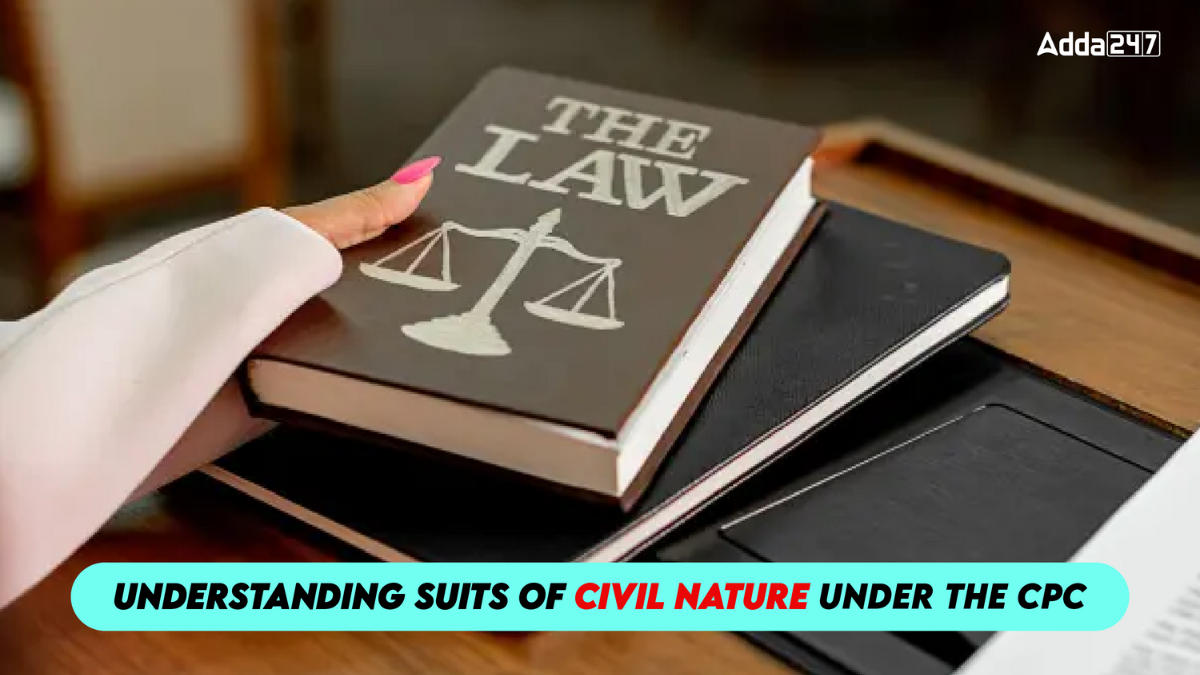Table of Contents
The Civil Procedure Code (CPC), 1908, forms the backbone of civil litigation in India, providing a structured framework for resolving disputes through the Judiciary. Among the various provisions, Section 9 of the CPC stands out as a crucial one, delineating the jurisdiction of civil Courts. It authorizes civil Courts to try all suits of a civil nature unless explicitly or implicitly barred by law. This article aims to explore the concept of “suit of civil nature,” the legal provisions surrounding it, and the significant case laws that have shaped its interpretation.
Defining the Term “Suit of Civil Nature”
A “suit of civil nature” refers to legal proceedings where the primary question involves the determination of private rights and obligations. Essentially, if the principal issue in a suit is related to civil rights—such as property, contracts, or family matters—it is categorized as a suit of a civil nature. This term is broad and encompasses not only pure civil disputes but also cases where the civil question is dominant, even if intertwined with religious or social issues.
For instance, disputes over property rights, restitution of conjugal rights, or enforcement of contracts are undoubtedly civil in nature. However, matters purely involving religious rites, social dignity, or political questions fall outside this domain, unless a civil right is at stake. As the Supreme Court held in Sinha Ramanuja v. Ranga Ramanuja (1961), a suit remains one of civil nature even if it involves questions of religion or caste, provided the principal issue is civil.
Legal Provisions Governing Suits of Civil Nature
Section 9 of the CPC encapsulates the authority of civil Courts to adjudicate on suits of a civil nature, establishing a general rule of jurisdiction. The provision is split into two parts: the first confers wide jurisdiction to civil Courts, while the second restricts it by stating that suits explicitly or implicitly barred are outside the Court’s purview.
Expressly Barred Suits: These are suits where jurisdiction is explicitly denied by a Statute. For example, matters falling under the exclusive domain of revenue Courts, consumer forums, or industrial tribunals are expressly barred from Civil Court jurisdiction. This was reinforced in Premier Automobiles v. K.D. Wadke, where the Supreme Court held that Civil Courts have no jurisdiction over disputes that fall under the purview of the Industrial Disputes Act.
Impliedly Barred Suits: These are suits barred by general legal principles rather than explicit statutory provisions. For instance, political disputes or matters involving pure religious rites are impliedly barred from civil jurisdiction, as these do not pertain to civil rights. The principle that where a statute provides a specific remedy, other forms of remedy are barred, was laid down in Dhulabhai v. State of M.P..
Case Laws on Suits of Civil Nature
Several landmark judgments have significantly contributed to the understanding of what constitutes a suit of a civil nature:
- Dhulabhai v. State of M.P. (1968): The Supreme Court laid down important principles concerning the exclusion of Civil Court jurisdiction. It held that Civil Courts have jurisdiction unless explicitly barred by the Statute or unless the Statute creates a special right and provides an exclusive remedy.
- Shankar Narayan Potti v. K. Sreedevi (1998): The Supreme Court affirmed that Civil Courts have inherent jurisdiction over all civil matters unless a part of the jurisdiction is specifically ousted by a statutory provision. This case reiterated the wide ambit of the term “suit of civil nature.”
- Rajasthan State Road Transport Corporation v. Krishna Kant (1995): This case further clarified the jurisdiction of Civil Courts in industrial disputes, holding that if the dispute arises from general law and not under the Industrial Disputes Act, Civil Courts have jurisdiction.
Conclusion
The concept of a “suit of civil nature” under the CPC is both broad and nuanced, encompassing a wide range of disputes where private rights are at stake. While Civil Courts have a wide jurisdiction to entertain such suits, this jurisdiction is subject to limitations imposed by statutory provisions and general legal principles. The distinction between suits of a civil nature and those expressly or impliedly barred is crucial in determining the maintainability of a suit in a Civil Court.



 TSPSC Group 1 Question Paper 2024, Downl...
TSPSC Group 1 Question Paper 2024, Downl...
 TSPSC Group 1 Answer key 2024 Out, Downl...
TSPSC Group 1 Answer key 2024 Out, Downl...
 UPSC Prelims 2024 Question Paper, Downlo...
UPSC Prelims 2024 Question Paper, Downlo...




